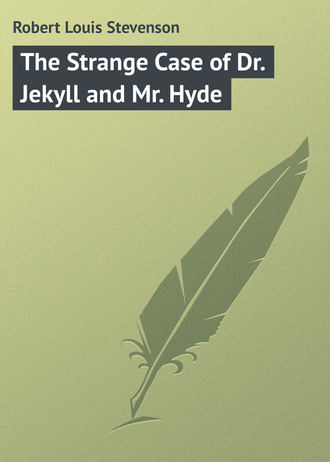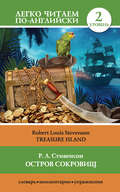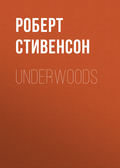
Роберт Льюис Стивенсон
The Strange Case of Dr. Jekyll and Mr. Hyde
Round the corner from the by-street, there was a square of ancient, handsome houses, now for the most part decayed from their high estate and let in flats and chambers to all sorts and conditions of men: map-engravers, architects, shady lawyers, and the agents of obscure enterprises. One house, however, second from the corner, was still occupied entire; and at the door of this, which wore a great air of wealth and comfort, though it was now plunged in darkness except for the fan-light, Mr. Utterson stopped and knocked. A well-dressed, elderly servant opened the door.
"Is Dr. Jekyll at home, Poole?" asked the lawyer.
"I will see, Mr. Utterson," said Poole, admitting the visitor, as he spoke, into a large, low-roofed, comfortable hall, paved with flags, warmed (after the fashion of a country house) by a bright, open fire, and furnished with costly cabinets of oak. "Will you wait here by the fire, sir? or shall I give you a light in the dining room?"
"Here, thank you," said the lawyer, and he drew near and leaned on the tall fender. This hall, in which he was now left alone, was a pet fancy of his friend the doctor's; and Utterson himself was wont to speak of it as the pleasantest room in London. But to-night there was a shudder in his blood; the face of Hyde sat heavy on his memory; he felt (what was rare with him) a nausea and distaste of life; and in the gloom of his spirits, he seemed to read a menace in the flickering of the firelight on the polished cabinets and the uneasy starting of the shadow on the roof. He was ashamed of his relief, when Poole presently returned to announce that Dr. Jekyll was gone out.
"I saw Mr. Hyde go in by the old dissecting-room door, Poole," he said. "Is that right, when Dr. Jekyll is from home?"
"Quite right, Mr. Utterson, sir," replied the servant. "Mr. Hyde has a key."
"Your master seems to repose a great deal of trust in that young man, Poole," resumed the other musingly.
"Yes, sir, he do indeed," said Poole. "We have all orders to obey him."
"I do not think I ever met Mr. Hyde?" asked Utterson.
"O, dear no, sir. He never dines here," replied the butler. "Indeed we see very little of him on this side of the house; he mostly comes and goes by the laboratory."
"Well, good-night, Poole."
"Good-night, Mr. Utterson." And the lawyer set out homeward with a very heavy heart. "Poor Harry Jekyll," he thought, "my mind misgives me he is in deep waters! He was wild when he was young; a long while ago to be sure; but in the law of God, there is no statute of limitations. Ay, it must be that; the ghost of some old sin, the cancer of some concealed disgrace: punishment coming, PEDE CLAUDO, years after memory has forgotten and self-love condoned the fault." And the lawyer, scared by the thought, brooded a while on his own past, groping in all the corners of memory, lest by chance some Jack-in-the-Box of an old iniquity should leap to light there. His past was fairly blameless; few men could read the rolls of their life with less apprehension; yet he was humbled to the dust by the many ill things he had done, and raised up again into a sober and fearful gratitude by the many that he had come so near to doing, yet avoided. And then by a return on his former subject, he conceived a spark of hope. "This Master Hyde, if he were studied," thought he, "must have secrets of his own; black secrets, by the look of him; secrets compared to which poor Jekyll's worst would be like sunshine. Things cannot continue as they are. It turns me cold to think of this creature stealing like a thief to Harry's bedside; poor Harry, what a wakening! And the danger of it; for if this Hyde suspects the existence of the will, he may grow impatient to inherit. Ay, I must put my shoulder to the wheel if Jekyll will but let me," he added, "if Jekyll will only let me." For once more he saw before his mind's eye, as clear as a transparency, the strange clauses of the will.
DR. JEKYLL WAS QUITE AT EASE
A fortnight later, by excellent good fortune, the doctor gave one of his pleasant dinners to some five or six old cronies, all intelligent, reputable men and all judges of good wine; and Mr. Utterson so contrived that he remained behind after the others had departed. This was no new arrangement, but a thing that had befallen many scores of times. Where Utterson was liked, he was liked well. Hosts loved to detain the dry lawyer, when the light-hearted and the loose-tongued had already their foot on the threshold; they liked to sit a while in his unobtrusive company, practising for solitude, sobering their minds in the man's rich silence after the expense and strain of gaiety. To this rule, Dr. Jekyll was no exception; and as he now sat on the opposite side of the fire—a large, well-made, smooth-faced man of fifty, with something of a slyish cast perhaps, but every mark of capacity and kindness—you could see by his looks that he cherished for Mr. Utterson a sincere and warm affection.
"I have been wanting to speak to you, Jekyll," began the latter.
"You know that will of yours?"
A close observer might have gathered that the topic was distasteful; but the doctor carried it off gaily. "My poor Utterson," said he, "you are unfortunate in such a client. I never saw a man so distressed as you were by my will; unless it were that hide-bound pedant, Lanyon, at what he called my scientific heresies. Oh, I know he's a good fellow—you needn't frown—an excellent fellow, and I always mean to see more of him; but a hide-bound pedant for all that; an ignorant, blatant pedant. I was never more disappointed in any man than Lanyon."
"You know I never approved of it," pursued Utterson, ruthlessly disregarding the fresh topic.
"My will? Yes, certainly, I know that," said the doctor, a trifle sharply. "You have told me so."
"Well, I tell you so again," continued the lawyer. "I have been learning something of young Hyde."
The large handsome face of Dr. Jekyll grew pale to the very lips, and there came a blackness about his eyes. "I do not care to hear more," said he. "This is a matter I thought we had agreed to drop."
"What I heard was abominable," said Utterson.
"It can make no change. You do not understand my position," returned the doctor, with a certain incoherency of manner. "I am painfully situated, Utterson; my position is a very strange—a very strange one. It is one of those affairs that cannot be mended by talking."
"Jekyll," said Utterson, "you know me: I am a man to be trusted. Make a clean breast of this in confidence; and I make no doubt I can get you out of it."
"My good Utterson," said the doctor, "this is very good of you, this is downright good of you, and I cannot find words to thank you in. I believe you fully; I would trust you before any man alive, ay, before myself, if I could make the choice; but indeed it isn't what you fancy; it is not so bad as that; and just to put your good heart at rest, I will tell you one thing: the moment I choose, I can be rid of Mr. Hyde. I give you my hand upon that; and I thank you again and again; and I will just add one little word, Utterson, that I'm sure you'll take in good part: this is a private matter, and I beg of you to let it sleep."
Utterson reflected a little, looking in the fire.
"I have no doubt you are perfectly right," he said at last, getting to his feet.
"Well, but since we have touched upon this business, and for the last time I hope," continued the doctor, "there is one point I should like you to understand. I have really a very great interest in poor Hyde. I know you have seen him; he told me so; and I fear he was rude. But, I do sincerely take a great, a very great interest in that young man; and if I am taken away, Utterson, I wish you to promise me that you will bear with him and get his rights for him. I think you would, if you knew all; and it would be a weight off my mind if you would promise."
"I can't pretend that I shall ever like him," said the lawyer.
"I don't ask that," pleaded Jekyll, laying his hand upon the other's arm; "I only ask for justice; I only ask you to help him for my sake, when I am no longer here."
Utterson heaved an irrepressible sigh. "Well," said he, "I promise."
THE CAREW MURDER CASE
N early a year later, in the month of October, 18—, London was startled by a crime of singular ferocity and rendered all the more notable by the high position of the victim. The details were few and startling. A maid servant living alone in a house not far from the river, had gone up-stairs to bed about eleven. Although a fog rolled over the city in the small hours, the early part of the night was cloudless, and the lane, which the maid's window overlooked, was brilliantly lit by the full moon. It seems she was romantically given, for she sat down upon her box, which stood immediately under the window, and fell into a dream of musing. Never (she used to say, with streaming tears, when she narrated that experience), never had she felt more at peace with all men or thought more kindly of the world. And as she so sat she became aware of an aged and beautiful gentleman with white hair, drawing near along the lane; and advancing to meet him, another and very small gentleman, to whom at first she paid less attention. When they had come within speech (which was just under the maid's eyes) the older man bowed and accosted the other with a very pretty manner of politeness. It did not seem as if the subject of his address were of great importance; indeed, from his pointing, it sometimes appeared as if he were only inquiring his way; but the moon shone on his face as he spoke, and the girl was pleased to watch it, it seemed to breathe such an innocent and old-world kindness of disposition, yet with something high too, as of a well-founded self-content. Presently her eye wandered to the other, and she was surprised to recognise in him a certain Mr. Hyde, who had once visited her master and for whom she had conceived a dislike. He had in his hand a heavy cane, with which he was trifling; but he answered never a word, and seemed to listen with an ill-contained impatience. And then all of a sudden he broke out in a great flame of anger, stamping with his foot, brandishing the cane, and carrying on (as the maid described it) like a madman. The old gentleman took a step back, with the air of one very much surprised and a trifle hurt; and at that Mr. Hyde broke out of all bounds and clubbed him to the earth. And next moment, with ape-like fury, he was trampling his victim under foot and hailing down a storm of blows, under which the bones were audibly shattered and the body jumped upon the roadway. At the horror of these sights and sounds, the maid fainted.
It was two o'clock when she came to herself and called for the police. The murderer was gone long ago; but there lay his victim in the middle of the lane, incredibly mangled. The stick with which the deed had been done, although it was of some rare and very tough and heavy wood, had broken in the middle under the stress of this insensate cruelty; and one splintered half had rolled in the neighbouring gutter—the other, without doubt, had been carried away by the murderer. A purse and a gold watch were found upon the victim: but no cards or papers, except a sealed and stamped envelope, which he had been probably carrying to the post, and which bore the name and address of Mr. Utterson.
This was brought to the lawyer the next morning, before he was out of bed; and he had no sooner seen it, and been told the circumstances, than he shot out a solemn lip. "I shall say nothing till I have seen the body," said he; "this may be very serious. Have the kindness to wait while I dress." And with the same grave countenance he hurried through his breakfast and drove to the police station, whither the body had been carried. As soon as he came into the cell, he nodded.
"Yes," said he, "I recognise him. I am sorry to say that this is Sir Danvers Carew."
"Good God, sir," exclaimed the officer, "is it possible?" And the next moment his eye lighted up with professional ambition. "This will make a deal of noise," he said. "And perhaps you can help us to the man." And he briefly narrated what the maid had seen, and showed the broken stick.
Mr. Utterson had already quailed at the name of Hyde; but when the stick was laid before him, he could doubt no longer; broken and battered as it was, he recognised it for one that he had himself presented many years before to Henry Jekyll.
"Is this Mr. Hyde a person of small stature?" he inquired.
"Particularly small and particularly wicked-looking, is what the maid calls him," said the officer.
Mr. Utterson reflected; and then, raising his head, "If you will come with me in my cab," he said, "I think I can take you to his house."
It was by this time about nine in the morning, and the first fog of the season. A great chocolate-coloured pall lowered over heaven, but the wind was continually charging and routing these embattled vapours; so that as the cab crawled from street to street, Mr. Utterson beheld a marvellous number of degrees and hues of twilight; for here it would be dark like the back-end of evening; and there would be a glow of a rich, lurid brown, like the light of some strange conflagration; and here, for a moment, the fog would be quite broken up, and a haggard shaft of daylight would glance in between the swirling wreaths. The dismal quarter of Soho seen under these changing glimpses, with its muddy ways, and slatternly passengers, and its lamps, which had never been extinguished or had been kindled afresh to combat this mournful re-invasion of darkness, seemed, in the lawyer's eyes, like a district of some city in a nightmare. The thoughts of his mind, besides, were of the gloomiest dye; and when he glanced at the companion of his drive, he was conscious of some touch of that terror of the law and the law's officers, which may at times assail the most honest.
As the cab drew up before the address indicated, the fog lifted a little and showed him a dingy street, a gin palace, a low French eating-house, a shop for the retail of penny numbers and twopenny salads, many ragged children huddled in the doorways, and many women of different nationalities passing out, key in hand, to have a morning glass; and the next moment the fog settled down again upon that part, as brown as umber, and cut him off from his blackguardly surroundings. This was the home of Henry Jekyll's favourite; of a man who was heir to a quarter of a million sterling.
An ivory-faced and silvery-haired old woman opened the door. She had an evil face, smoothed by hypocrisy; but her manners were excellent. Yes, she said, this was Mr. Hyde's, but he was not at home; he had been in that night very late, but had gone away again in less than an hour; there was nothing strange in that; his habits were very irregular, and he was often absent; for instance, it was nearly two months since she had seen him till yesterday.
"Very well, then, we wish to see his rooms," said the lawyer; and when the woman began to declare it was impossible, "I had better tell you who this person is," he added. "This is Inspector Newcomen of Scotland Yard."
A flash of odious joy appeared upon the woman's face. "Ah!" said she, "he is in trouble! What has he done?"
Mr. Utterson and the inspector exchanged glances. "He don't seem a very popular character," observed the latter. "And now, my good woman, just let me and this gentleman have a look about us."
In the whole extent of the house, which but for the old woman remained otherwise empty, Mr. Hyde had only used a couple of rooms; but these were furnished with luxury and good taste. A closet was filled with wine; the plate was of silver, the napery elegant; a good picture hung upon the walls, a gift (as Utterson supposed) from Henry Jekyll, who was much of a connoisseur; and the carpets were of many plies and agreeable in colour. At this moment, however, the rooms bore every mark of having been recently and hurriedly ransacked; clothes lay about the floor, with their pockets inside out; lock-fast drawers stood open; and on the hearth there lay a pile of grey ashes, as though many papers had been burned. From these embers the inspector disinterred the butt-end of a green cheque-book, which had resisted the action of the fire; the other half of the stick was found behind the door; and as this clinched his suspicions, the officer declared himself delighted. A visit to the bank, where several thousand pounds were found to be lying to the murderer's credit, completed his gratification.
"You may depend upon it, sir," he told Mr. Utterson: "I have him in my hand. He must have lost his head, or he never would have left the stick or, above all, burned the cheque-book. Why, money's life to the man. We have nothing to do but wait for him at the bank, and get out the handbills."
This last, however, was not so easy of accomplishment; for Mr. Hyde had numbered few familiars—even the master of the servant-maid had only seen him twice; his family could nowhere be traced; he had never been photographed; and the few who could describe him differed widely, as common observers will. Only on one point, were they agreed; and that was the haunting sense of unexpressed deformity with which the fugitive impressed his beholders.







